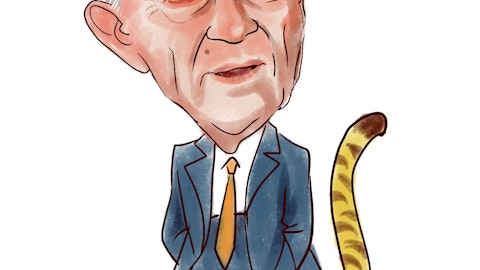Are Apple Inc. (NASDAQ:AAPL), Facebook Inc (NASDAQ:FB), Amazon.com, Inc. (NASDAQ:AMZN), and Alphabet Inc (NASDAQ:GOOGL) stocks worth adding to your portfolio? In short the answer is likely yes, since each of these companies is among the leaders in its respective industry. However, each stock is rather expensive and it is not guaranteed that all of them will outperform the market, at least in the short term. There are many ways to analyze a stock, one of which is to see how smart investors are trading it, which is what we do at Insider Monkey. The smartest investors in recent quarters seem to be, well, robots or quant hedge funds.
We track over 700 hedge funds and other institutional investors and analyze every quarter the general sentiment among them towards thousands of stock. One particularly interesting group of investors that we follow are quantitative hedge funds, many of which are some of the largest and best-performing funds on Wall Street. We calculated the returns of some of these funds using data from their publicly available 13F filings, and determined that most quant funds managed to outperform the market even though in some instances their picks were less risky than the broader market. For example, the top five stock picks of Jim Simons’ Renaissance Technologies posted an equal-weighted average gain of 1.17% per month between 2008 and 2012, outperforming the S&P 500 which inched up by 0.29% per month during the same period. When we adjusted returns for known factor returns like size, value, and momentum RenTech’s alpha turned out to be 103 basis points per month. This means this quant hedge fund’s top picks were able to beat the market by almost a percentage point a month by investing in a portfolio of less risky stocks.
Having said that, we have lined up six quantitative hedge funds: Cliff Asness’ AQR Capital Management, David E. Shaw’s D. E. Shaw & Co., Jim Simons’ Renaissance Technologies, Peter Muller’s PDT Partners, and Neil Chriss’ Hutchin Hill Capital. In a previous article, we have discussed most of these funds, as well as their top stock picks. In this piece, we’ll take a look how these funds traded the aforementioned four stocks: Apple Inc. (NASDAQ:AAPL), Facebook Inc (NASDAQ:FB), Amazon.com, Inc. (NASDAQ:AMZN), and Alphabet Inc (NASDAQ:GOOGL). Most of the quant funds in question own shares of each of these stocks, but based on the size of each position and the changes it underwent during the third quarter, we will try to determine two stocks that could potentially represent the best investments.

Let’s start with Apple Inc. (NASDAQ:AAPL), in which all five of the six quants held shares heading into the fourth quarter, while one fund closed its position between July and September. The largest positions are held by D. E. Shaw & Co. and AQR Capital Management, which disclosed ownership of 6.68 million shares and 6.44 million shares, respectively. Moreover, both funds held Apple Inc. (NASDAQ:AAPL) as their second-largest holding and both increased their exposure to the stock over the quarter, but, while AQR Capital increased it by just 14%, D. E. Shaw boosted it by 178%. Other quants that increased their stakes included PDT Partners, which added 17,200 shares to its stake, taking it to 89,500 shares, while Hutchin Hill Capital added 24,900 shares and held 25,000 shares at the end of September. However, at the same time, we have two funds that limited their exposure to the stock. As stated earlier, one investor that sold all of its shares in Apple is Renaissance Technologies, which had previously owned nearly 1.10 million shares (at the end of June). In addition, Two Sigma Advisors cut its stake by 81% and held just 48,531 shares heading into the fourth quarter. So, from what it looks like the quants that we are discussing in this article are overall bullish on Apple Inc. (NASDAQ:AAPL), which is also supported by our more general data across all hedge funds tracked by us, with the number of investors long Apple jumping to 145 from 116 during the third quarter.
Compared to Apple, Facebook Inc (NASDAQ:FB) is much less popular among the six quants we have selected. First of all, two of them, PDT Partners and Hutchin Hill Capital, didn’t held any shares of Facebook in the third quarter. Second of all, three of the remaining four funds significantly reduced their positions in the company. The only fund that increased its stake in Facebook Inc (NASDAQ:FB) is AQR Capital Management, which held 3.34 million shares at the end of September, up by 17% over the quarter. On the other hand, Renaissance Technologies, held the smallest stake, which was reduced by 75% to 166,000 shares during the third quarter. Two Sigma Advisors and D. E. Shaw cut their stakes by 61% and 66% over the quarter to 702,034 shares and 1.51 million shares, respectively. However, Facebook Inc (NASDAQ:FB) ranked as the second most popular stock among the funds in our database with 149 funds holding shares at the end of September and it was the favorite stock among billionaire investors tracked by us.
Amazon.com, Inc. (NASDAQ:AMZN) is the only stock in this list in which all six quants disclosed long positions in their latest 13F filings. The largest stake is held by D. E. Shaw & Co., which inched down its position by 8% to 1.08 million shares during the third quarter. Another fund that reduced its exposure to the company is Renaissance Technologies, which owned 102,555 shares, down by 56% over the quarter. On the other hand, Two Sigma Advisors and AQR Capital Management increased their positions by 23% and 9% respectively and held 356,601 shares and 547,459 shares, respectively at the end of September. PDT Partners and Hutchin Hill Capital held smaller positions, with the former having raised its stake by 29% to 12,700 shares and the latter having initiated a new position that amassed 4,862 shares. It’s worth mentioning, that in the equity portfolios of two funds, D. E. Shaw and Two Sigma Advisors, Amazon.com, Inc. (NASDAQ:AMZN) represented the largest positions. Overall, Amazon.com, Inc. (NASDAQ:AMZN) was also the most popular stock among the funds we track, with 150 of them holding shares heading into the fourth quarter.
Finally, there’s Alphabet Inc (NASDAQ:GOOGL). On the one hand, only five out of the six quants covered in this article owned shares of Alphabet during the third quarter, excluding PDT Partners. On the other hand, four of these five funds increased their stakes, while one, Hutchin Hill Capital, initiated a stake during the third quarter. However, Hutchin Hill held just 5,500 class C shares of Alphabet Inc (NASDAQ:GOOG) at the end of September. On the other hand, most of the remaining funds held both class A and class C shares and all of them held class A shares, so we’ll focus on that. The largest stakes are held by AQR Capital Management and Renaissance Technologies, which owned 548,238 shares and 524,048 shares, respectively. Moreover, RenTech boosted its position by tenfold during the third quarter. D. E. Shaw also increased its stake by 146% to 361,482 shares, while Two Sigma Advisors raised it by 12% to 365,160 shares. Alphabet’s both classes of stock rank among the most popular in our database and combined they make Alphabet Inc (NASDAQ:GOOGL) the favorite company among hedge funds tracked by us.
Now that we have discussed how the six quants traded each of these four stocks during the third quarter and looking at the general sentiment towards them, we can narrow down the list to two stocks. Judging by the data collected, the two stocks that we think that are worth more attention are Apple Inc. (NASDAQ:AAPL) and Amazon.com, Inc. (NASDAQ:AMZN). Both of these stocks were on the top two positions in the equity portfolios of two funds and both had the largest number of quants holding shares at the end of September. However, it’s important to mention that this conclusion is rather subjective and obviously more research is required before making a decision regarding the inclusion of these stocks in one’s portfolio.
Disclosure: none





